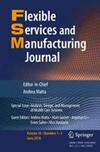家庭献血预约、预约及采集路线的三阶段数学分析
IF 3.2
3区 工程技术
Q2 ENGINEERING, INDUSTRIAL
引用次数: 0
摘要
在西方国家,所谓的献血供应链(BDSC)向多个卫生服务机构提供血液单位。它的第一个梯队是从献血者那里收集血液,这需要仔细的管理,因为血液供应不平衡可能会引发血液短缺和浪费的交替时期。然而,与其他BDSC梯队相比,文献中对采血管理的研究很少。在这项工作中,我们提出了一种新的血液采集组织模式,在这种模式下,血液在献血者家中采集,并为其管理提供决策支持工具。这种新模式为尚未得到充分研究的采血梯队提供了新的贡献,同时,它响应了卫生服务地方化的新需求。所提出的决策支持工具由一个具有三个决策阶段的相互关联的数学框架组成:(i)创建分配给献血者的献血时段的规划模型,(ii)使用一组灵活的标准在线分配这些时段,以及(iii)带时间窗口的多行程车辆路线问题(MTVRP-TW),以确定献血者家中采血车的路线。主要目标是平衡不同天之间的血液单位生产,并尽量减少血液流动车队行驶的距离,同时尊重与献血者谈判的时间窗口。该框架还具有在捐赠者提出预订请求时立即提供插槽列表以供选择的功能。决策支持工具已经在一个真正的意大利供应商的数据上进行了测试。结果证实了它的有效性,以及在合理的时间框架内提供高质量和经济可持续解决方案的能力。本文章由计算机程序翻译,如有差异,请以英文原文为准。
A three-stage matheuristic for home blood donation appointment reservation and collection routing
Abstract In Western countries, the so-called Blood Donation Supply Chain (BDSC) provides blood units to several health services. Its first echelon is the collection of unit from donors, which requires a careful management because an unbalanced supply of units to the rest of the chain could trigger alternating periods of blood shortage and wastage. However, the management of blood collection is only marginally studied in the literature, in comparison to other BDSC echelons. In this work, we propose a new organizational model for blood collection, in which blood is collected at donor’s homes, and provide a decision support tool for its management. This new model provides a novel contribution to the understudied blood collection echelon and, at the same time, it responds to the emerging need of delocalization of health services. The proposed decision support tool consists of an interconnected matheuristic framework with three decision stages: (i) a planning model to create the donation slots that will be assigned to donors, (ii) an online allocation of these slots using a flexible set of criteria, and (iii) a Multi-Trip Vehicle Routing Problem with Time Windows (MTVRP-TW) to route the bloodmobiles that collect blood at donors’ homes. The main goals are to balance the production of blood units between days and to minimize the distance travelled by the bloodmobile fleet, while respecting time windows negotiated with donors. This framework also has the feature of immediately providing a list of slots to choose from when a donor makes a booking request. The decision support tool has been tested on data from a real Italian provider. Results confirm its effectiveness, and the capability of providing good quality and economically sustainable solutions in reasonable timeframes.
求助全文
通过发布文献求助,成功后即可免费获取论文全文。
去求助
来源期刊

Flexible Services and Manufacturing Journal
ENGINEERING, MANUFACTURING-OPERATIONS RESEARCH & MANAGEMENT SCIENCE
CiteScore
5.60
自引率
7.40%
发文量
41
审稿时长
>12 weeks
期刊介绍:
The mission of the Flexible Services and Manufacturing Journal, formerly known as the International Journal of Flexible Manufacturing Systems, is to publish original, high-quality research papers in the field of services and manufacturing management. All aspects in this field including the interface between engineering and management, the design and analysis of service and manufacturing systems as well as operational planning and decision support are covered. The journal seeks papers that have a clear focus on the applicability in the real business world including all kinds of services and manufacturing industries, e.g. in logistics, transportation, health care, manufacturing-based services, production planning and control, and supply chain management. Flexibility should be understood in its widest sense as a system’s ability to respond to changes in the environment through improved decision making and business development procedures and enabling IT solutions.
 求助内容:
求助内容: 应助结果提醒方式:
应助结果提醒方式:


